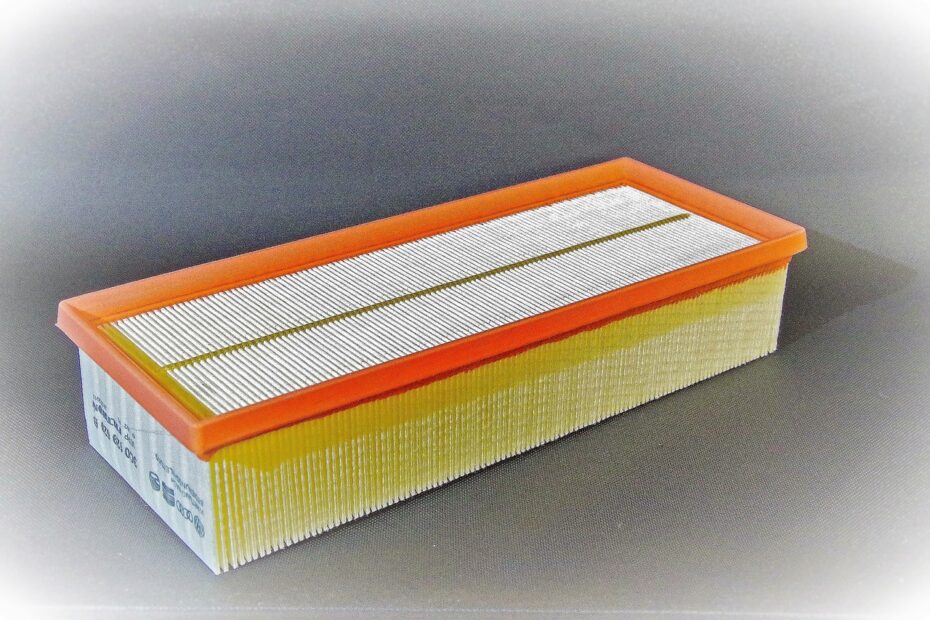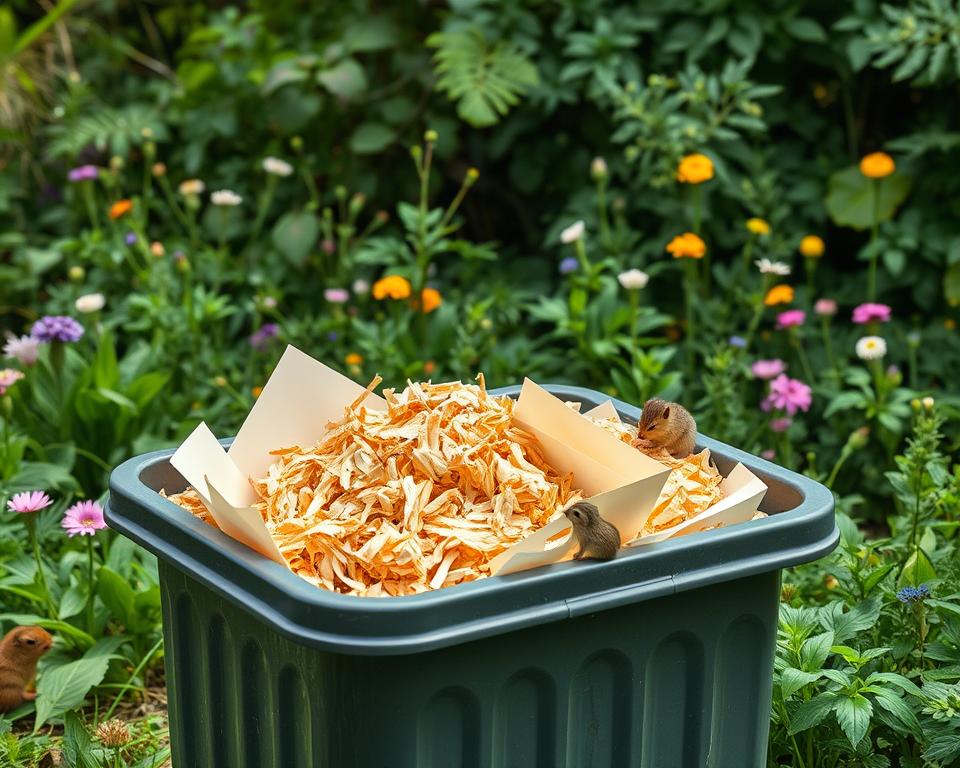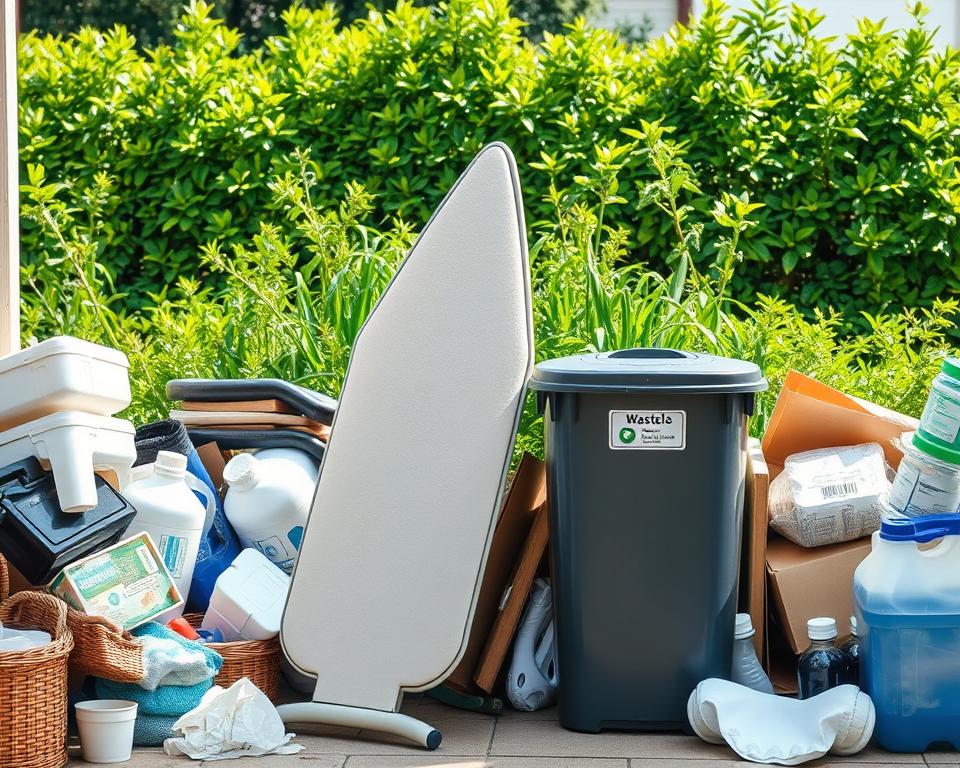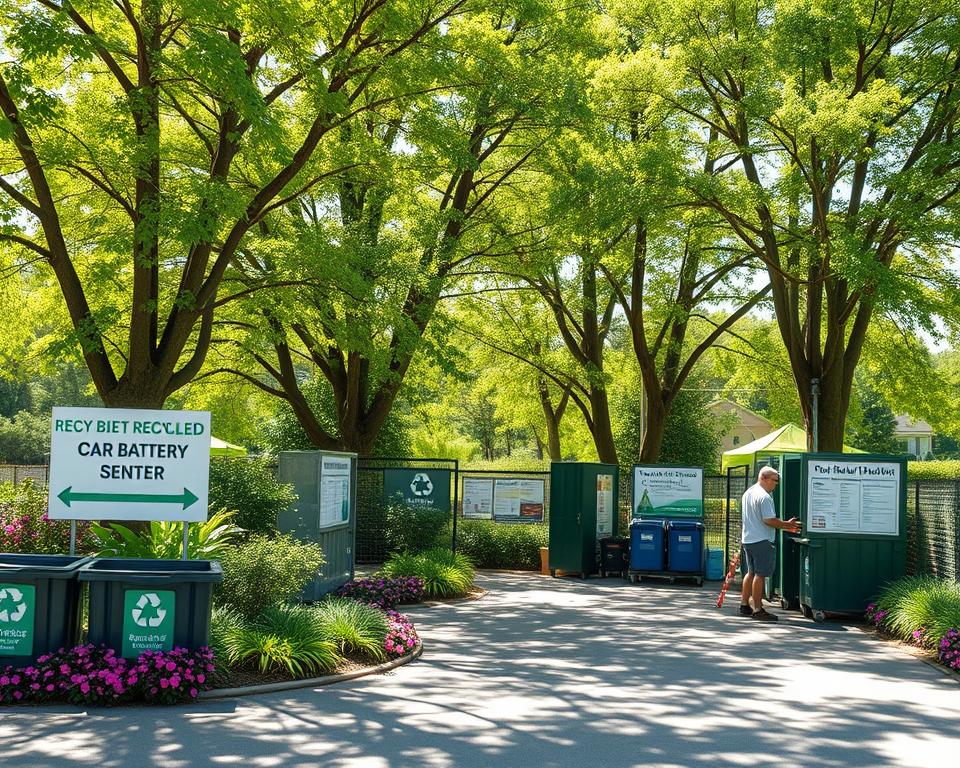Did you know air filters should be changed every 3 months? It’s important to dispose of them properly to keep your air clean. Since there are no special programs for air filter recycling, we must use basic trash disposal. This guide will show you how to dispose of air filters the right way. It’s for your family’s health and the planet’s.
Key Takeaways
- Air filters should be replaced every 2-3 months per manufacturer recommendations
- Dispose of used air filters in the regular trash, taking care to contain any loose debris
- Avoid shaking or disturbing a dirty air filter to prevent releasing particles back into the air
- Shut off HVAC system before replacing the filter to avoid damage from unfiltered air
- Consider reusable air filters as an environmentally friendly alternative to disposable options
Understanding the Importance of Proper Air Filter Disposal
Keeping your indoor air clean and healthy is key for your family’s well-being. But, throwing away air filters the wrong way can mess this up. Used air filters can hold dust, pollen, mold, and bacteria. If not disposed of right, these can get back into your air.
Maintaining a Clean and Healthy Indoor Air Supply
These pollutants can make your air quality worse. They can also make breathing problems like asthma or allergies worse. It’s important to get rid of air filters the right way to keep your air clean and healthy.
Protecting Family Members with Respiratory Conditions
People with asthma or allergies are especially at risk. Being around these pollutants can make their symptoms worse. It’s vital to dispose of air filters properly to keep everyone’s health safe, especially those with breathing issues.
| Filter Type | Recyclability | Disposal Considerations |
|---|---|---|
| HEPA Fiberglass | Non-recyclable | Can sit indefinitely in landfills |
| Polyester Pleated | Non-recyclable | Can be reused, not recyclable |
| Cotton | Recyclable | Can be recycled to reduce resource use |
| Aluminum (Electrostatic) | Non-recyclable | Can be disposed of in regular trash |
| Activated Charcoal | Partially Recyclable | Can be recycled after removing metal and plastic components |
Getting rid of air filters the right way is crucial. It helps keep your indoor air clean and healthy. This reduces the risk of harmful contaminants and protects your family’s health, especially those with breathing problems.
Types of Air Filters and Replacement Schedules
Keeping your indoor air clean and healthy is key. You need to know about the different air filters used in HVAC systems, cars, fridges, and air purifiers. Also, you should know when to replace them. Changing filters regularly helps your systems work better, improves air quality, and makes your equipment last longer.
HVAC filters vary in material and MERV (Minimum Efficiency Reporting Value) ratings. Higher MERV ratings mean they catch smaller particles better. HEPA filters, for example, have a MERV rating of 16 or higher. Fiberglass filters, with a MERV rating of 1-4, are often used first. Pleated filters, with accordion-like folds, can catch more contaminants and have various MERV ratings.
Disposable HVAC filters should be replaced every 1-3 months, depending on how much you use them and your environment. Reusable filters can be washed and used again, usually needing a clean every three months. Car air filters need to be replaced every 12-24 months. Refrigerator and air purifier filters should be changed every 6-12 months, as the maker suggests.
| Filter Type | Replacement Schedule |
|---|---|
| HVAC Filters | Every 1-3 months (disposable), quarterly (reusable) |
| Vehicle Air Filters | Every 12-24 months |
| Refrigerator Filters | Every 6-12 months |
| Air Purifier Filters | Every 3-12 months |
Following the right replacement schedule for each air filter type is crucial. It keeps your HVAC system clean and efficient, ensures good air quality, and makes your appliances last longer. Regular filter care is a simple but important step to a healthy and comfy indoor space.
Prepare for Air Filter Disposal
Before you remove and throw away an old air filter, you need to get ready. First, collect all the things you’ll need. This includes a big plastic bag to hold the used filter. You might also want gloves or a dust mask to keep things clean and safe.
Gather Necessary Materials
- A plastic bag, preferably sealable, large enough to fit the used air filter
- Gloves to protect your hands
- A dust mask or respirator to prevent inhaling any particles
Turn Off HVAC System
Before you take out the old air filter, turn off your HVAC system. This step stops any bad stuff from spreading through your home. It makes sure you can get rid of the filter safely.
By preparing your space and turning off the HVAC, you can dispose of the air filter well. This keeps your home clean and healthy.
Step-by-Step Guide to Disposing of an Air Filter
Replacing an air filter is key to keeping your HVAC system clean and efficient. But, it’s also important to dispose of the old filter properly. This ensures a healthy indoor environment. Here’s how to safely and responsibly get rid of your used air filter.
Removing the Old Air Filter
First, find the air filter in your HVAC system, car, fridge, or air purifier. Carefully pull out the old filter. Be gentle to avoid spreading dust or debris into the air. This step is vital to prevent contamination in your home or office.
Containing the Filter in a Plastic Bag
Next, put the used air filter in a sealable plastic bag. This air filter containment step is important. It keeps dust or particles from escaping and harming your indoor air quality.
Sealing the Bag and Disposing Outdoors
Make sure the plastic bag is tightly sealed with tape if needed. Then, take the bag outside. Dispose of it in an outdoor air filter disposal bin, like a trash can or dumpster. This keeps the used filter out of your indoor space.
By following these steps, you can dispose of your old air filters safely. This keeps your indoor environment clean and healthy for your family.
Dispose of air filter Properly in Specific Appliances
Disposing of air filters can vary by appliance type. Knowing the right way to get rid of them is key. This ensures we handle these important parts safely and responsibly.
Vehicle Air Filters
Replacing vehicle air filters is crucial for your car’s engine health. To dispose of a used filter, open the housing, take out the old one, and put it in a sealed bag. This keeps debris from spreading into the environment.
Refrigerator Air Filters
Refrigerator air filters are on the back panel. To access them, unscrew the cover. Remove the old filter and dispose of it in a sealed bag. This keeps dust and particles from getting back into your home.
Air Purifier and Humidifier Filters
Air purifier and humidifier filters are behind the front grill. Remove the old filter and put it in a sealed bag for disposal. This stops pollutants or bacteria from getting back into the air.
By following the right steps for each appliance, we can safely dispose of used air filters. This helps keep our indoor spaces cleaner and healthier.
Dangers of Improper Air Filter Disposal
Not disposing of used air filters right can harm indoor air quality and health. When air filters are not thrown away correctly, dust, mold, and other harmful stuff can get back into your home. This can make breathing problems worse and expose people to dangerous pollutants.
Also, pets or kids might get into the used filters, which is risky. Air filters need to be changed every three to twelve months, depending on how dirty they get. Sealing dirty filters in plastic bags with tape helps keep your air clean and reduces pollutants.
Recycling air filters can also help the environment. It uses less raw materials and can even help with carbon footprint. Some places take non-recyclable filters to reuse them, which is good for the planet. But, it’s important to wear masks, glasses, and gloves when handling used filters to avoid getting sick.
Ignoring how to throw away air filters can hurt your indoor air and health. It’s key to take the right steps when getting rid of used filters to keep your home healthy.
Benefits of Regular Air Filter Replacement
Replacing your air filters regularly does more than keep your home clean. It also makes your HVAC system work better. Clean filters let air move freely, saving energy and cutting down on bills.
Improved Air Quality
Dirt and dust in air filters make your HVAC system work harder. This can lower the air quality inside, which is bad for people with breathing problems or allergies. Changing filters often keeps the air in your home clean and healthy, helping your family stay well.
Energy Efficiency
Clean air filters make your HVAC system run smoothly. This means it uses less energy and costs you less money. Keeping up with filter changes helps your home breathe better and saves you money.
| Benefit | Description |
|---|---|
| Improved Indoor Air Quality | Clean air filters help remove contaminants, allergens, and airborne particles, promoting a healthier living environment. |
| HVAC Energy Efficiency | Unobstructed air filters reduce the strain on HVAC systems, resulting in lower energy consumption and utility costs. |
| Environmental Benefits | Proper air filter replacement and disposal contribute to reducing waste and greenhouse gas emissions, aligning with sustainability efforts. |
By making air filter replacement a priority, you get cleaner air and a more efficient HVAC system. Plus, you help the planet by reducing waste and emissions.
Tips for Maintaining a Clean HVAC System
Proper air filter disposal is just one part of keeping your HVAC system clean. To keep your indoor air quality high and your system working well, you need a full plan for HVAC care.
Regular maintenance of your HVAC system is key. This means checking and cleaning the blower, coils, and ducts to stop contaminants from building up. Experts say to change the HVAC air filter every 30-60 days to keep your system efficient and air quality good.
- Reusable air filters can be cleaned by rinsing with warm water or vacuuming with a hose attachment.
- It’s important to trap old HVAC filters in a plastic trash bag to prevent dust and particles from spreading.
- Shaking or hitting a dirty air filter can release contaminants such as mold spores, viruses, and germs back into the air.
- Sealing the trash bag with tape ensures that all debris and contaminants from the filter are contained.
Also, getting professional HVAC checks can spot and fix problems early. This way, you can improve your indoor air quality and system performance even more.
| HVAC Maintenance Task | Recommended Frequency |
|---|---|
| Air Filter Replacement | Every 30-60 days |
| HVAC System Inspection | Annually |
| Coil Cleaning | Annually |
| Duct Cleaning | Every 3-5 years |
Keeping your HVAC system clean is vital for better indoor air and efficient climate control. By following these tips, you can keep your HVAC system in great shape. This way, you’ll enjoy a comfortable and healthy home.
Environmentally Friendly Air Filter Options
Homeowners looking to reduce their environmental impact have several eco-friendly air filter options. Reusable air filters are made from natural materials like soy. They can be washed and reused for years, cutting down on waste. Some HVAC manufacturers also offer recycling programs for used filters.
Fiberglass filters, like HEPA filters, do not break down and can stay in landfills forever if not recycled. Some recycling centers accept HEPA filters, but availability can vary. Polyester filters are not recyclable and take time to break down in landfills. Cotton filters, on the other hand, are recyclable.
- Aluminum filters, found in A/C units and furnaces, can be thrown away in regular trash.
- Humidifier wick filters, also made of aluminum, can be disposed of in regular trash.
- Carbon filters, used in air purifiers, can be recycled after removing metal or plastic parts.
Choosing sustainable air filter solutions and disposing of them correctly helps the environment. It also keeps indoor spaces healthy. Recycling used filters reduces landfill waste, supporting eco-friendly AC repair practices.
| Air Filter Type | Eco-Friendly Disposal |
|---|---|
| Fiberglass (HEPA) | Recycling availability varies by location |
| Polyester | Not recyclable, can take time to degrade in landfills |
| Cotton | Recyclable |
| Aluminum (A/C, furnace) | Safe for regular household trash |
| Humidifier wick | Aluminum, can be disposed of in regular trash |
| Carbon (air purifier) | Recyclable after removing metal/plastic parts |
By opting for reusable air filters and proper disposal, homeowners can help the environment. They also keep their indoor spaces healthy.
Conclusion
Proper disposal of air filters is key to a clean, healthy home. When replacing filters for HVAC, vehicles, refrigerators, or air purifiers, we keep harmful particles out of the air. This protects our families’ health.
Regularly replacing air filters also boosts energy efficiency. It helps reduce our environmental footprint. Using eco-friendly filters is a great way to do this.
Keeping air filters in good shape is vital for clean air and a working HVAC system. Homeowners should talk to HVAC experts for the latest on disposal and sustainable filters. This way, we all help make our homes healthier and greener.
Getting rid of air filters right is crucial for air quality, HVAC health, and the planet. By following the right steps and staying updated, we can make a big difference in our homes and communities.
FAQ
What are the steps for properly disposing of an air filter?
To dispose of an air filter properly, follow these steps:
1. Gather a plastic bag large enough to contain the used filter, as well as gloves and a dust mask.
2. Turn off the HVAC system to prevent the spread of contaminants.
3. Carefully remove the old air filter and place it directly into the plastic bag.
4. Seal the bag tightly, using tape if necessary, and take it outside to dispose of it in an outdoor trash can or dumpster.
How often should I replace my air filters?
The replacement schedule for air filters varies depending on the type of appliance:
– HVAC filters should be changed every 1-3 months.
– Vehicle air filters typically need replacement every 12-24 months.
– Refrigerator and air purifier filters may need changing every 6-12 months, depending on the manufacturer’s recommendations.
What are the dangers of improper air filter disposal?
Failing to properly dispose of used air filters can release harmful contaminants like dust, pollen, mold spores, and bacteria back into the indoor air. This can compromise air quality and aggravate respiratory conditions, especially for vulnerable family members.
What are the benefits of regular air filter replacement?
Regularly replacing air filters can:
– Improve indoor air quality by removing pollutants.
– Increase the energy efficiency of HVAC systems, leading to cost savings on utility bills.
What are some eco-friendly air filter options?
Eco-friendly air filter options include reusable filters made from materials like soy or natural fibers, which can be washed and reused for years. Some HVAC manufacturers also offer filter recycling programs for responsible disposal.



